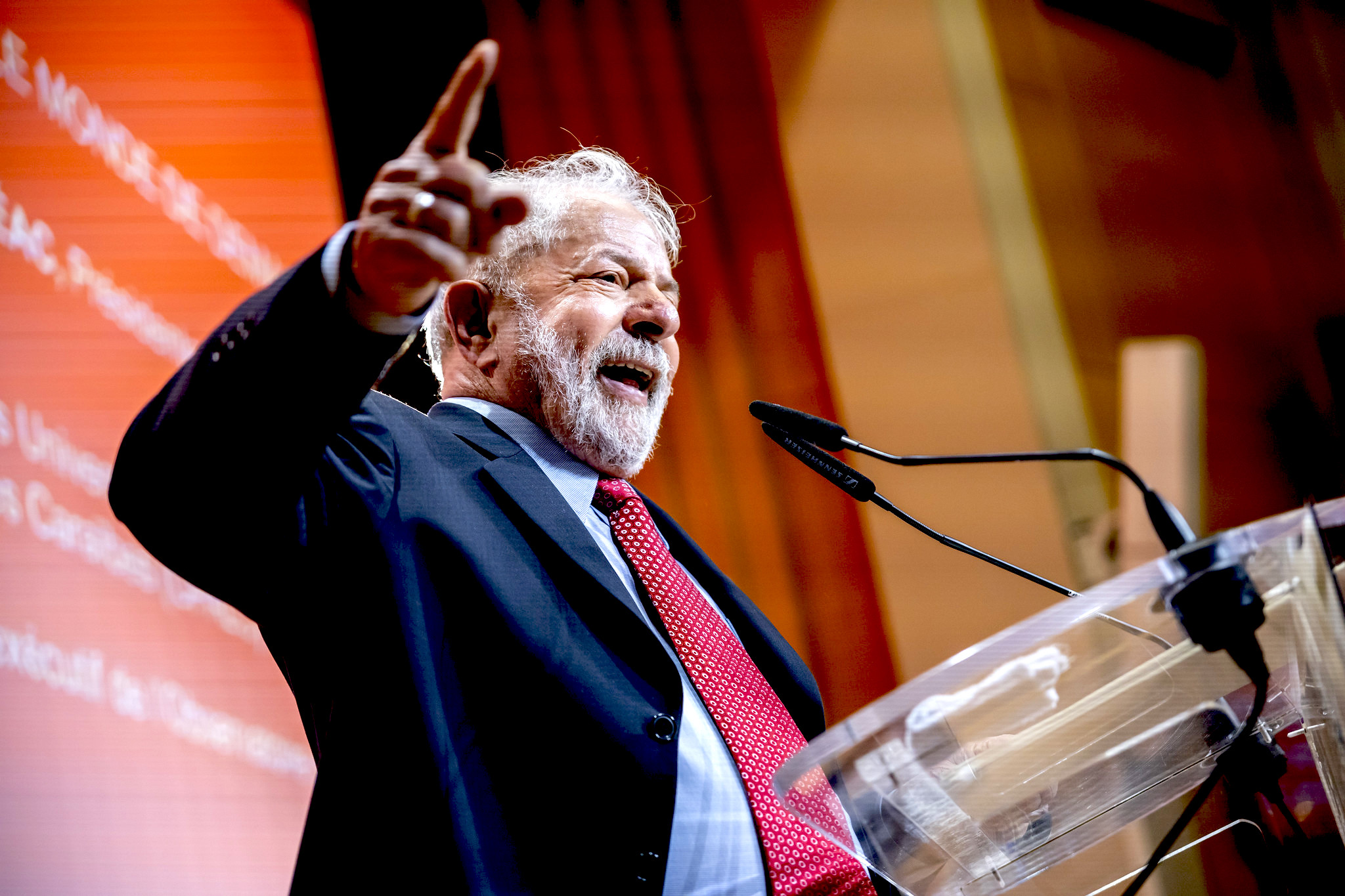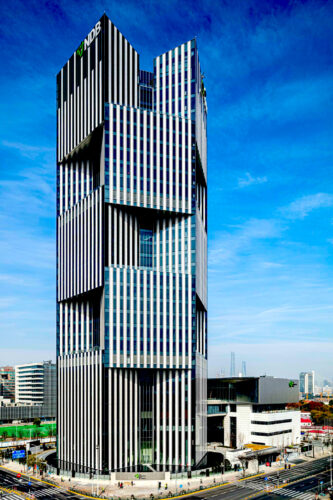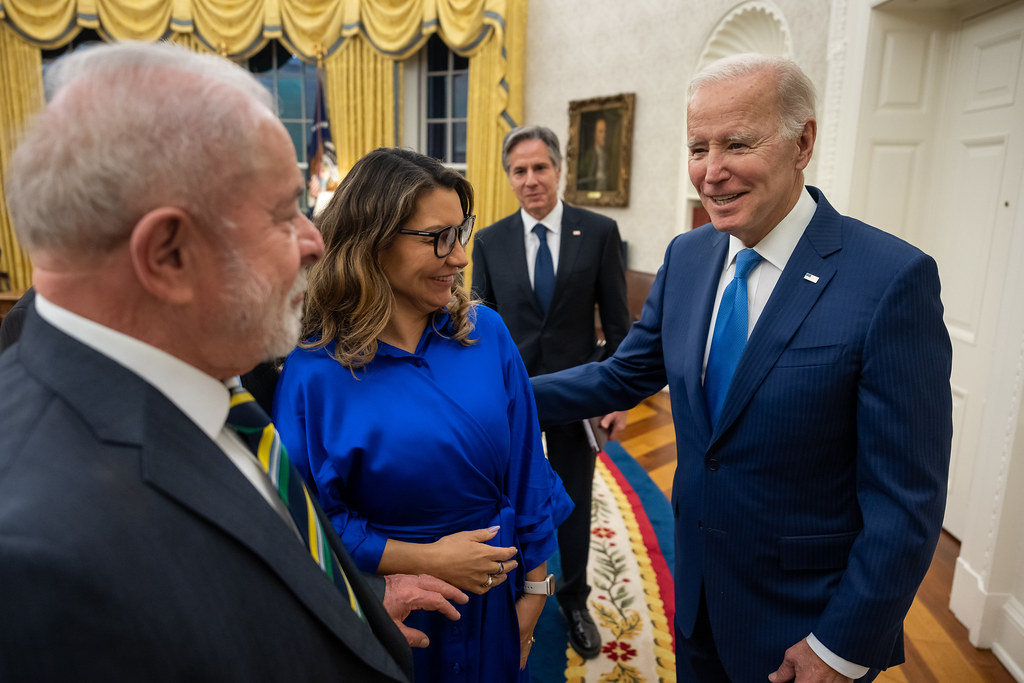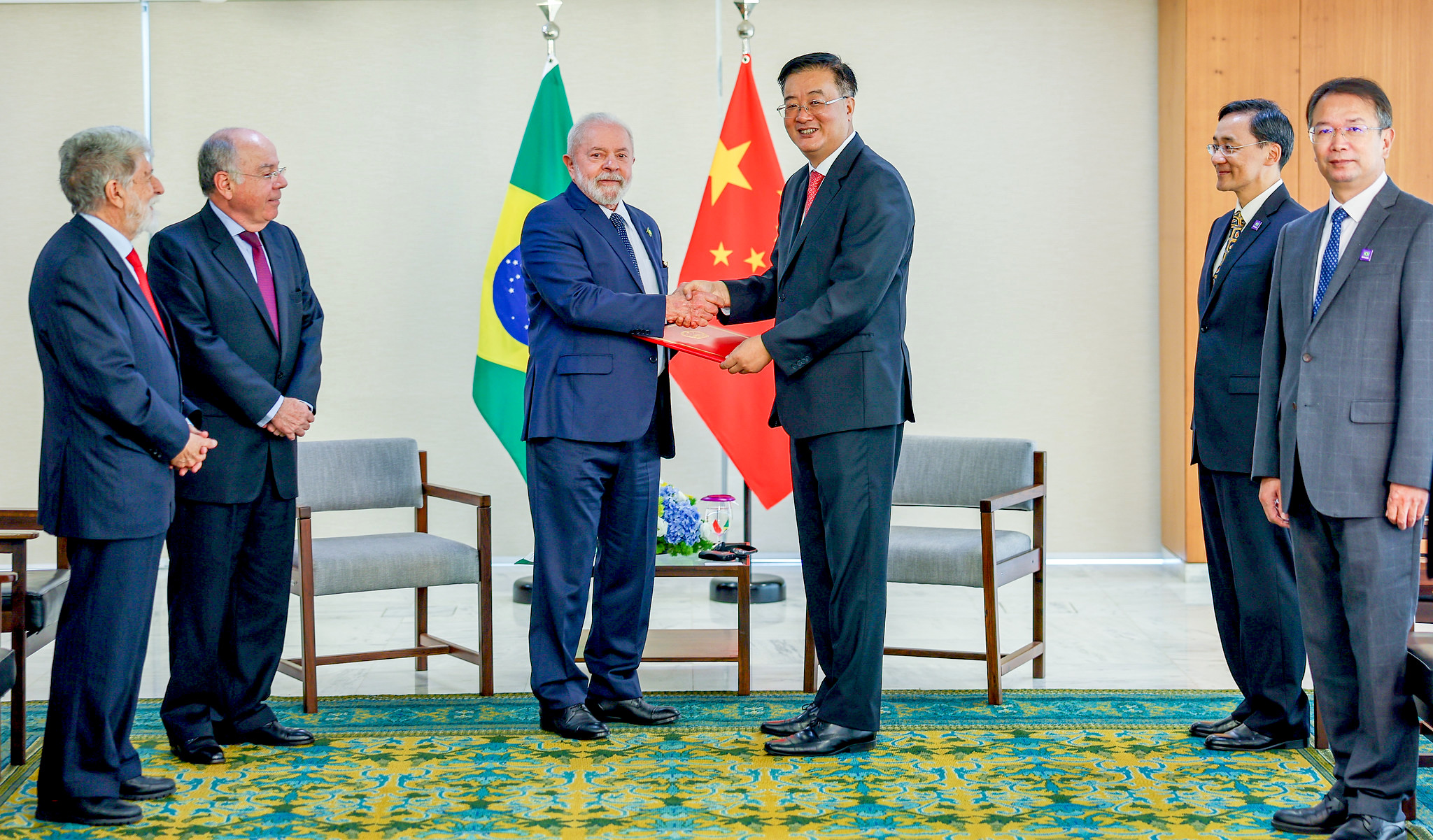The Brazilian president is joined by a major delegation this week as more than 20 agreements are expected to be signed with the Amazon country’s largest trading partner.

Brazil’s Lula da Silva in November 2021. (Mídia NINJA, Flickr, CC BY-NC 2.0)
Brazil’s President President Luiz Inácio Lula da Silva this week is in the People’s Republic of China for one of the most important state visits of his third presidential term.
The diplomatic mission, which will take place on Thursday and Friday, will be joined by ministers and governors — a reflection of the size of the existing and future possibilities in the relationship between Brazil and the Asian power.
It is expected that over 20 agreements will be signed in Beijing, intensifying the already huge trade between the two countries. China has been Brazil’s biggest trading partner since 2009. Last year, the commercial balance between them surpassed $150 billion and represented the major source of investment in all Latin American countries.
The visit, initially scheduled for March, was delayed due to Lula being diagnosed with pneumonia at the time.

BRICS’ New Development Bank headquarters in Shanghai. (Donnie28, CC BY-SA 4.0, Wikimedia Commons)
On Thursday, Lula will attend the inauguration of former Brazilian President Dilma Rousseff as president of the New Development Bank (NDB), the BRICS bank, in Shanghai.
Rousseff replaces Marcos Troyjo, a name linked to former Bolsonaro minister Paulo Guedes. On Friday, Lula will meet in Beijing with union leaders, the president of the National People’s Assembly Zhao Leji, Prime Minister Li Qiang and President Xi Jinping.
Lula’s fourth foreign mission after his third presidential inauguration, the trip comes two months after his visit to Washington. Since taking the presidency in January this year, Lula has landed in Argentina, Uruguay and the United States. Now, he will head to China and the United Arab Emirates, marking the country’s comeback to the international arena after the period of isolation under Jair Bolsonaro’s government (Liberal Party).
President Lula asks why all trade has to be done in dollars. pic.twitter.com/3mRMQSb7ip
— Kawsachun News (@KawsachunNews) April 13, 2023
Lula will travel with ministers Fernando Haddad (Finance), Marina Silva (Environment and Climate Change), Carlos Fávaro (Agriculture and Livestock), Luciana Santos (Science, Technology and Innovation), Mauro Vieira (Foreign Relations), Alexandre Silveira (Mines and Energy), Paulo Teixeira (Agrarian Development and Family Farming), Wellington Dias (Development and Social Assistance) and Juscelino Filho (Communications).
The Brazilian delegation also includes Governors Jerônimo Rodrigues (state of Bahia), Elmano de Freitas (state of Ceará), Carlos Brandão (state of Maranhão), Helder Barbalho (state of Pará) and Fátima Bezerra (state of Rio Grande do Norte).
The visit takes place amid growing tensions between China and the U.S. The two biggest world economies have been exchanging sanctions and accusations of espionage at a fast pace.
Beijing’s non-alignment with the U.S. and NATO position on the war in Ukraine has further deepened the divergence. However, Brazil has historically adopted a neutral position in foreign affairs and usually negotiates even with enemies.
[The deepening Brazilian-Chinese ties are a key part of the emerging multilateral world, an alternative economic and political system that is alarming Washington.]
The scope of Lula’s first trip to a non-Western country during his third presidential term contrasts with the results of the visit to the White House.
The U.S. promised to invest in the Amazon Fund and talked to Brazil about a possible partnership involving semiconductors. However, so far, resources have not been transferred, and the talks have not evolved into agreements.

U.S. President Joe Biden, right, meets with Brazilian President Luiz Inacio Lula da Silva and his wife Janja Lula de Silva, on Feb. 10. (White House/Adam Schultz)
To Ana Tereza Marra, a professor at the ABC Federal University (UFABC, in Portuguese) and coordinator of the China Group of the Brazilian Foreign Policy Observatory (OPEB, in Portuguese), the results of bilateral relations with the U.S. are still shy, but there is an ongoing “political approach” with the White House. The visit to China is promising because it may offer more, she says.
“The U.S. wants to invest in climate, but Congress must approve resources. Only then, they may or may not invest. They sanctioned that chips law [CHIPS and Science Act], which is their attempt to change the global semiconductor supply chain and bring it to the U.S. and their allies,” she says. “They have money to invest in other countries, but, at the same time, they wave to Brazil, although there is nothing agreed upon yet.”
Marra says that “China, by its very nature and its relations with Brazil in recent years, manages to make things concrete more quickly.”
Regarding the ability of the Itamaraty – the country’s Ministry of Foreign Affairs – and Brazil to maintain their historical position of neutrality and negotiation in the midst of an increasingly intense and fragmented global scenario, she believes that it is still not possible to know the limits and possibilities of this stance.

Brazilian President Luiz Inácio Lula da Silva, third from left, during the presentation of credentials by the Chinese Ambassador to Brazil, Zhu Qingqiao on Feb. 3. (Ricardo Stuckert/Palácio do Planalto/Flickr, CC BY 2.0)
“China wants pragmatism more than alignment. It is the U.S. that seeks Brazil’s alignment. China wants Brazil to be pragmatic and to embrace opportunities. The U.S. demands [Brazil] take a stance, but even this demand today is not a demand at all costs,” says the UFABC professor.
Avoiding a ‘Sacrifice Zone’
In 2022, Brazil sold $31.78 billion in soybeans to China and dozens of billions of dollars in iron and oil. China, in turn, exports to Brazil products with greater technological complexity, such as solar panels and phone equipment.
The soybean production chain in Brazil is linked to large estates, transgenics and the intense use of pesticides. Therefore, a rise in Chinese appetite for the product could mean the growth of environmental and human rights violations in Brazil.
To prevent the country from becoming a sort of “sacrifice zone” to Chinese economic growth and the enrichment of Brazilian estate owners, researcher Ana Tereza Marra advocates the adoption of some public policies.
“One way to improve economic relations is by attracting Chinese investments to Brazil directed at sectors of strategic interest. The government has to be clear about which sectors are these and which projects they want China to finance,” the professor tells Brasil de Fato. “That’s the Lula government’s goal. These investments support the country’s reindustrialization.”
This article is from Brasil de Fato and is edited by Flávia Chacon.

Lula – only leader in the ‘west’ with a brain!
Let’s hope the US doesn’t invade Brazil or fund a proxy war, or a coup d’etat or something like that.
“The soybean production chain in Brazil is linked to large estates, transgenics and the intense use of pesticides. Therefore, a rise in Chinese appetite for the product could mean the growth of environmental and human rights violations in Brazil.”
I’ll risk the result of becoming persona non grata around here for continuing to sound notes of caution regarding China. I have noticed, in South America and Africa especially, that China acts completely amorally regarding the environmental impacts of their investments into the agricultural activities of those nations distant from their shores. I am not defending the US or the West, the originators of industrial agriculture, and all the environmental ills attendant to that. China seems to cop the attitude that if those on the various home fronts don’t protect their own interests, then why should they, eh?
Hands on the wheel, eyes wide open.
China has sustained civilization for maybe 4000 years, let’s trust China will be a partner to the world, one of cooperation and one that will sustain life.
We have failed in both, the world war materials and to the brink of disaster with war and destabilization.
China’s foreign policy is clearly different from the US whose policy is more often my way or the highway, using the dollar and the military to intimidate nations. That approach is being threatened by China and other nation’s are expected to follow. The result most likely is that the US will get the message and change the we are number one to behave more like China. That may be wishful thinking when you observe the behavior of the politicians and the MIC. But there clearly is pressure to change or to lose influence around the world.
Much success to Brazil in its efforts to chart its own course based on the best interests of its people. Actually, what a quaint idea, that governments should work first and foremost for the benefit of and to better the quality of life of their peoples. Perhaps the “world’s leading democracies” that make up the Western alliance should take note. Hello EU. Perhaps Annalena should be the next Queen in charge.
“The US wants to invest in climate…” Well, that’s nonsense. The US insists on an “us vs them” stance from every country in the world for it’s Cold War II project. Cold War II is of absolutely no use nor benefit for anyone or anything on this planet except US’ dreams of a forever American led uni-polar world. Even Brzezinski in his Grand Chessboard plan did not believe that America could nor even should maintain its uni-polar hegemony in perpetuity. This idea is nothing but a neocon fever dream.
Cold War II however, is the worst possible disaster for dealing with the effects of global warming and climate change. It’s a knife in the heart to our survival as species on this planet. This is simply because any solution to the problems of global climate change effects; everywhere, all at once, and forever increasing, rests on cooperation. Without enthusiastic local and international cooperation and coordination to address the human causes of global warming, no solution and no silver bullet is effective.
If someone was deliberately trying to make a sustainable, livable world for the future impossible, dividing the world into warring camps aka Cold War II, is exactly the way to do it. What a coincidence that America is driving, even insisting, on these divisions. But hey, the fossil fuel and arms industries are pulling in the bucks hand over fist, so there is that…
Now Brazil is getting uppity too. OMG! What will it be, color revolution, assassination, regime change? On the other hand, America is more and more the odd man out in the civilized world and perhaps these standard ploys will not work quite as well now. I imagine that for the State department necons the world is beginning to look like a game of whack-a-mole because that is of course what they insist on. Nothing will change until they are gone. Hopefully, Lula and a proud Brazil will continue long after.
Well, let’s give President Joe Biden this much. He did make a campaign promise back in 2020 to bring people together.
Who knew, however, the people he would be bringing together were China, Iran, Saudi Arabia, Russia, and now, Brazil?
What me worry?
LOL!